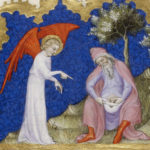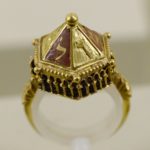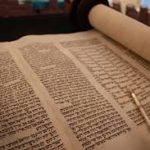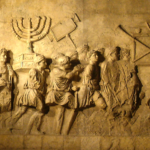The churchyard hangs as a backdrop to civilization and a way of life that few relate to. Yet Sunday after Sunday the pews filled and the people came with eager anticipation and gracious thankfulness. Inside this temple plated and hung on two stone tablets was the 10 commandments. Open, lying face up, on a podium directly underneath the stone tablets was a book that held the written Torah or the divine words of an eternal God.
The Two Parts to the Torah
Orthodox Judaism believes that both the Written and the Oral Torah are of divine origin and that each contains the exact words of God without any human influence. Torah, which means ‘teaching’, is God’s revealed instructions to the Jewish people. The Torah encompasses all parts of life and is pertinent in every situation that the Orthodox Jew will face.
There are two parts to the Torah as mentioned above. The Written Torah is often called the Tanakh, which stands for Torah(T), Nevi’im(N), and Detuvium(K). Contained within the Torah is the Five Books of Moses as they were given to the Jewish People at Mount Sinai during their exodus from Egypt approximately 3500 years ago. These five books include Genesis, Exodus, Leviticus, Numbers, and Deuteronomy.
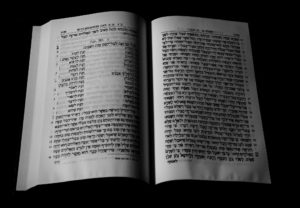 Prophets (Nev’im) are direct prophecies or recordings of what God said to the prophets. Writings (Ketuvim) are books written by the prophets with the guidance of God. The books contained within the Tanakh are mainly written in Hebrew and are sometimes referred to as the Hebrew Bible.
Prophets (Nev’im) are direct prophecies or recordings of what God said to the prophets. Writings (Ketuvim) are books written by the prophets with the guidance of God. The books contained within the Tanakh are mainly written in Hebrew and are sometimes referred to as the Hebrew Bible.
The Oral Torah contains the explanations of the Written Torah which was originally passed down verbally from generation to generation. When the Temple in Jerusalem was destroyed in the 2nd century C.E. it was decided that the Oral Torah should be written down so as to not be forgotten. Thus, a compiled version of the Oral Torah was written as one document called the Mishnah.
The core beliefs of Orthodox Judaism
Rambam, an important Jewish philosopher of the Middle Ages, summarized the core beliefs of Orthodox Judaism in what he coined as the 13 Principles of Faith.
1.) I believe with perfect faith that God is the Creator and Ruler of all things. He alone has made, does make, and will make all things.
2.) I believe with perfect faith that God is One. There is no unity that is in any way like His. He alone is our God. He was, He is, and He will be.
3.) I believe with perfect faith that God does not have a body. Physical concepts do not apply to Him.
4.) I believe with perfect faith that God is first and last.
5.) I believe with perfect faith that it is only proper to pray to God. One may not pray to anyone or anything else.
6.) I believe with perfect faith that all the words of the prophets are true.
7.) I believe with perfect faith that the prophecy of Moses is absolutely true. He was the chief of all prophets, both before and after Him.
8.) I believe with perfect faith that the entire Torah that we now have is that which was given to Moses.
9.) I believe with perfect faith that this Torah will not be changed and that there will never be another given by God.
10.) I believe with perfect faith that God knows all of man’s deeds and thoughts. It is thus written (Psalm 33:15), “He has molded every heart together, He understands what each one does.”
11.) I believe with perfect faith that God rewards those who keep His commandments and punishes those who transgress Him.
12.) I believe with perfect faith in the coming of the Messiah. How long it takes, I will await His coming every day.
13.) I believe with perfect faith that the dead will be brought back to life when God wills it to happen.
From the time they get up in the morning until the time they go to bed at night, the Orthodox Jew will observe God’s commandments concerning prayer, dress, food, sex, family relations, social behavior, the Sabbath day and any holidays. Orthodox Jews view themselves as the continuation of the beliefs and practices of normative Judaism. The difference is in the details that are emphasized and the attitudes toward modern culture and the State of Israel.
Sources: About.com


